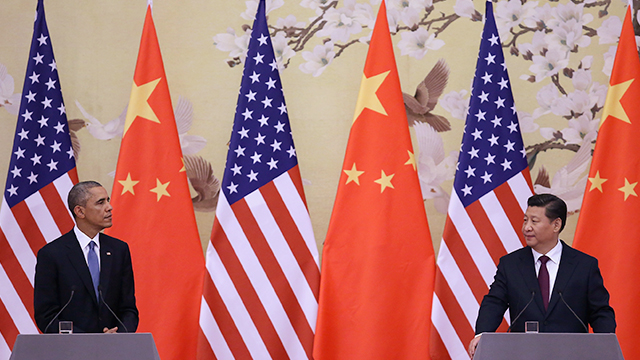
By Richard Wike
Pew Reserach Center
September 22, 2015
Chinese President Xi Jinping’s tour of the United States comes at a time of many tensions between the two nations. Experts believe China was behind the recent cyberattack against the Office of Personnel Management. America’s Asian allies are worried about Beijing’s aggressive posture in the South China Sea. Human rights groups warn that Xi’s tenure in office has coincided with a harsh crackdown on public dissent, such as a recent incident involving rights defense lawyers and another involving women’s rights activists. And Donald Trump and his competitors have made the economic challenge from China a major issue in the Republican presidential primary contest.
As Pew Research Center surveys have shown, many of these tensions are reflected in American public opinion. Meanwhile, the Chinese public has its own complaints about the U.S. – in particular, most believe the U.S. is trying to contain a rising China.
Here are six key findings about American public opinion toward China, and Chinese public opinion about the U.S.
1Overall, Americans and Chinese do not have especially positive views of each other. In our 2015 survey, just 38% of Americans have a favorable view of China, compared with a global median of 55% across 39 countries. Only a slightly higher share of the Chinese public – 44% – give the U.S. a positive rating, in stark contrast with the global median of 69%.
2 On a list of possible issues with China, Americans are most concerned about economic issues, cybersecurity and human rights. Specifically, the amount of U.S. debt held by China and the loss of jobs to China are Americans’ top worries, but cyberattacks and Beijing’s human rights record aren’t far behind.
On a list of possible issues with China, Americans are most concerned about economic issues, cybersecurity and human rights. Specifically, the amount of U.S. debt held by China and the loss of jobs to China are Americans’ top worries, but cyberattacks and Beijing’s human rights record aren’t far behind.
3Republicans are more critical of China compared with Democrats. From U.S. debt held by China to the loss of U.S. jobs and China’s growing military power, Republicans are far more concerned about these issues as a very serious problem than are Democrats. The exception is China’s impact on the environment, which worries Democrats more.
4Many Americans think China will ultimately become the world’s top superpower, and most Chinese agree. Americans are closely divided on this question: 46% say China either already has or will someday replace the U.S. as the top global power, while 48% say this will never happen. However, 67% of Chinese think their country has supplanted the U.S. or will in the future; only 16% say it won’t happen.
5Most Chinese think the U.S. is trying to hold their nation back. More than half (54%) of Chinese say the U.S. is trying to prevent China from becoming as powerful as the U.S. Only 28% say the U.S. accepts that China will become as powerful.
6 Young people in both countries express more favorable attitudes of the other nation. Americans ages 18-29 are more than twice as likely as those ages 50 or older to have a favorable opinion of China (55% vs. 27%). Similarly, 59% of Chinese adults under 30 give the U.S. a positive rating, compared with 29% of those 50 and older. And younger Chinese also find U.S. soft power more appealing – for example, 59% said they like American ideas about democracy in our 2012 poll, compared with 40% of the 50 and older group.
Young people in both countries express more favorable attitudes of the other nation. Americans ages 18-29 are more than twice as likely as those ages 50 or older to have a favorable opinion of China (55% vs. 27%). Similarly, 59% of Chinese adults under 30 give the U.S. a positive rating, compared with 29% of those 50 and older. And younger Chinese also find U.S. soft power more appealing – for example, 59% said they like American ideas about democracy in our 2012 poll, compared with 40% of the 50 and older group.
Topics: China, Foreign Affairs and Policy, Global Balance of Power, International Governments and Institutions, International Threats and Allies, U.S. Global Image and Anti-Americanism



Expositores: Oscar Vidarte (PUCP) Fernando González Vigil (Universidad del Pacífico) Inscripciones aquí. Leer más
Una retrospectiva para entender los próximos cuatro años. Leer más
En la conferencia se hará una presentación de los temas más relevantes del proceso de negociación se llevó a cabo desde el 2012, así como del acuerdo de paz firmado entre el Gobierno colombiano y la guerrilla de las FARC a finales del 2016. Se analizarán los desafíos y las... Leer más
El Observatorio de las Relaciones Peruano-Norteamericanas (ORPN) de la Universidad del Pacífico es un programa encargado de analizar y difundir información relevante sobre la situación política, económica y social de Estados Unidos y analizar, desde una perspectiva multidisciplinaria, su efecto en las relaciones bilaterales con el Perú.
© 2024 Universidad del Pacífico - Departamento Académico de Humanidades. Todos los derechos reservados.

